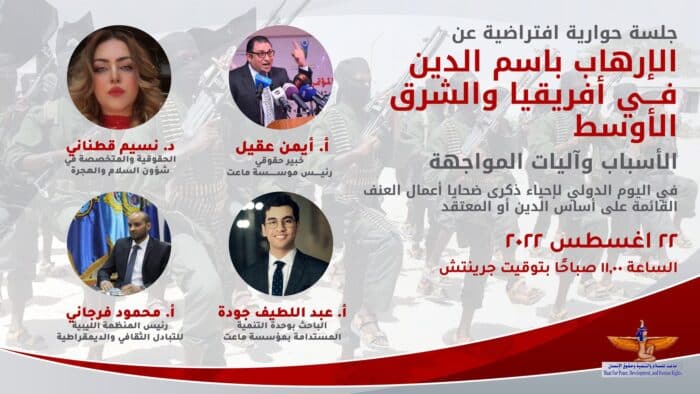Okeil: Foreign interference has enabled terrorist organizations rather than restricting it
Qatanani: States’ political coverage feeds terrorism
Ferjani: Terrorism based on corrupt beliefs cannot be negotiated with
Gouda: After ISIS’ defeat in the Levant and Iraq, it targeted Africa as a new crime scene
A group of human rights experts emphasized that good governance is a key guarantee in the battle against terrorism in Africa and the Middle East. This was indicated in a dialogue session organized by Maat for Peace, Development and Human Rights under the title: "The phenomenon of violence on religious grounds in the Middle East and Africa."
The dialogue session focused on these regions, the most affected by terrorism and religious violence, to determine the motives of this phenomenon and its different patterns, and the roles that civil society and the international community can play to counter it. The session was concluded with a set of recommendations that may help getting us out of the vicious circle of religious-based terrorism that is prevalent in many countries in the two regions.
On his part, Ayman Okeil, an international human rights expert and President of Maat, noted that the presence of 7 out of the 13 states under ISIS in Africa is quite disturbing and raises the alarm, as the organization has used Africa as its new crime scene since its fall in the Levant and Iraq. The returnees from ISIS represent a major dilemma in Africa, and the international community must unite to put an end it, Okeil stressed.
Nassim Qatanani, a human rights advocate specializing in peace and immigration affairs, stated that countries’ political coverage of terrorist groups only exacerbates the phenomenon of terrorism, and warns that these countries must stop providing such coverage. Violence against religious symbols can lead to more violence, such as in the case in Eritrea, and freedom of religion and belief is one of the most important guarantees of security and stability, Al-Qatanani added.
Nassim Qatanani, a human rights advocate specializing in peace and immigration affairs, stated that countries’ political coverage of terrorist groups only exacerbates the phenomenon of terrorism, and warns that these countries must stop providing such coverage. Violence against religious symbols can lead to more violence, such as in the case in Eritrea, and freedom of religion and belief is one of the most important guarantees of security and stability, Al-Qatanani added.
In a related context, Mahmoud Al-Ferjani, head of the Libyan Organization for Cultural Exchange and Democracy, indicated that the best way to deal with the phenomenon of terrorism is to know its root causes and treat them. He pointed out that development is one of the factors that would contribute to defeating terrorism, and that there are two types of terrorists; one that works for money, and this type can be negotiated with and reintegrated into society; whereas the other is a terrorist of faith, and dialogue with him is fruitless.
The discussion was moderated by Abdellatef Gouda, a researcher in the Sustainable Development Unit at Maat. Gouda stated that terrorism began in the Middle East in the eighties, then worsened with the beginning of the new millennium, and reached its climax with the control of ISIS over huge parts of the territory of Iraq and Syria. With the successive defeats of the organization in Iraq and the Levant, he added, it began to look for new strongholds and found no better environment than restless Africa. Therefore, it began to transfer its fighters to it. Given this fact, dealing with the phenomenon of terrorism in Africa is not in isolation from dealing with it in the Middle East.
It is worth noting that Maat organized this dialogue session on the sidelines of International Day Commemorating the Victims of Acts of Violence Based on Religion or Belief..



shortlink: https://maatpeace.org/en/?p=36626












